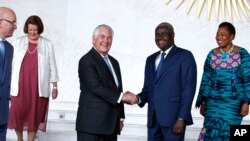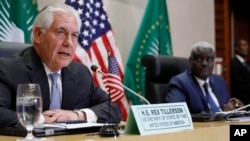U.S. Secretary of State Rex Tillerson has re-affirmed the U.S. commitment to Africa, in an effort to end the controversy caused by President Donald Trump's reported derogatory comments about the continent.
The top U.S. diplomat’s meeting Thursday with African Union Commission Chairperson Moussa Faki came two months after Trump reportedly used an expletive to describe Haiti and some African countries. The African Union and several African governments said they were outraged by the comment.
“I think the U.S. commitment to Africa is quite clear in terms of the importance we place on the relationship. The president wrote a personal letter to the AU,” said Tillerson in a joint press conference with Faki at AU headquarters in Addis Ababa, Ethiopia.
Faki said that he had received a letter dated January 25 and “this incident” has been put “in the past.” Faki added the visit of the top U.S. diplomat is evidence that “relations between Africa and the U.S. is personified.”
Tillerson said promoting peace and security, development and trade, and good governance, are three pillars of Washington’s approach to Africa. He said the U.S. appreciated the statements on South Sudan made at the AU summit in January, where it raised the possibility of sanctions for the violation of ceasefires in the conflict-stricken nation.
Meanwhile, AU plans to sign a Continental Free Trade Agreement later this month aimed to economically integrate the continent, which has a population of 1.2 billion people and a combined estimated GDP of $3.5 trillion.
Tillerson said Washington supports “the African Union's economic regional integration efforts to lower intra-trade barriers on the continent, boost more intra-regional trade - which we know has been a central goal of the negotiations around the constant Continental Free Trade Agreement, which we are quite supportive of.”
Leaders of the African Union, which represents 55 countries, also outlined an official theme of anti-corruption for the year of 2018 at an annual summit in late January.
“We think these are all positive developments. So the continent is moving in one direction and we're just hoping the current administration is taking note, and is also engaging this continent in a direction in which it's trying to move,” said Brahima Coulibaly, Brookings Institution’s Africa Growth Initiative senior fellow.
Lack of care for Africa?
But the Trump administration is under criticism for a proposed 2018 budget cut on efforts to combat HIV and AIDS.
While Tillerson has announced nearly $533 million in new humanitarian assistance for food insecurity in some African nations, the Trump administration has not proposed a signature initiative to aid Africans.
“It is unusual for a Secretary of State to make a trip like this and to have no deliverables, to have no initiative that they're ready to announce,” said Witney Schneidman, the Brookings Institution’s Africa Growth Initiative nonresident fellow.
After more than a year since entering the White House, Trump still has not nominated a chief U.S. diplomat for Africa, and embassies in the Democratic Republic of Congo, Somalia, South Africa and in five other African countries remain without ambassadors.
Speaking Tuesday before leaving for Africa, Tillerson said the United States is "eager" to lower barriers to trade and investment on the continent, whose largest trading partner by far is China.
He added the U.S. approach of "incentivizing good governance" contrasts sharply to China's, "which encourages dependency, using opaque contracts, predatory loan practices and corrupt deals that mire nations in debt and undercut their sovereignty."
Tillerson's one-week, five-nation trip is focusing on counterterrorism, promoting peace, good governance and trade and investment. He is scheduled to meet with top officials in Chad, Djibouti, Ethiopia, Kenya and Nigeria, all of them U.S. allies in the war against terrorism and jihadist groups such as Boko Haram, Al-Shabab and Islamic State.
Without partnerships to build infrastructure and achieve more economic development, Tillerson warned there will be "new ways for terrorists to exploit the next generation."
Tillerson also said the U.S. and African leaders "must work to find long-term diplomatic solutions" to regional conflicts "that cause so much human suffering."





